Whose vs who’s: tips to help you learn the difference
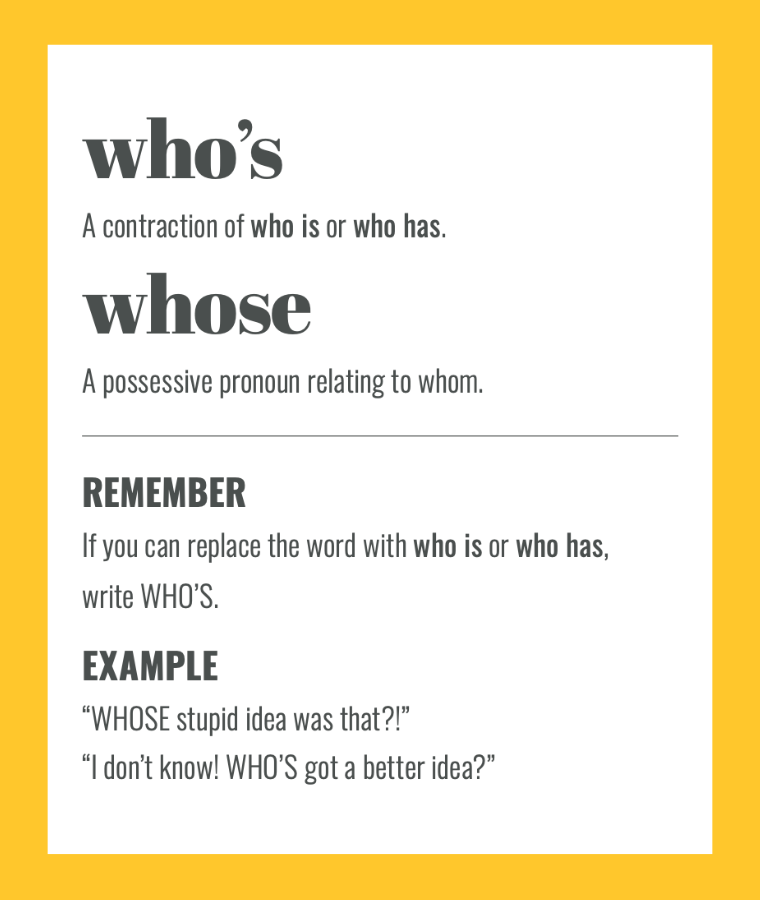
WHOSE vs WHO’S – learn the difference between these two commonly confused spellings.
WHOSE and WHO’S are easy to confuse. Though they sound the same – and both have their root in the word WHO – they have different meanings. These simple tips will help you learn the difference.
When to use whose
WHOSE is a possessive pronoun used to ask or tell whom something belongs to.
For example:
“Whose pencil is this?”
OR
“JK Rowling is an author whose books are loved by millions.”
When to use who’s
WHO’S is a contraction of who + is or who + has.
For example:
“Who’s coming with me?” = “Who is coming with me?”
OR
“Shall I see who’s gone with him?” = “Shall I see who has gone with him?”
In a nutshell, if you can replace the word you’re writing with either who is or who has, always use WHO’S.
I hope this guidance helps you remember the difference between whose and who’s. Let me know how you get on.
Want more writing tips?
For more language love, join my Clever Copy Club and get monthly updates direct to your inbox. Alternatively, email me, follow me on Twitter, connect on LinkedIn or like my page on Facebook.
Get more tips in The Little Book of Confusables
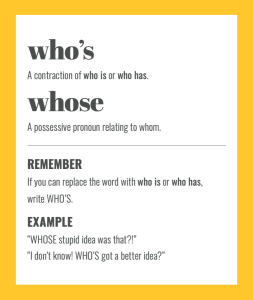
WHO’S vs WHOSE. Excerpt from The Little Book of Confusables by Sarah Townsend.
Hoard and horde: spelling tips to remember the difference
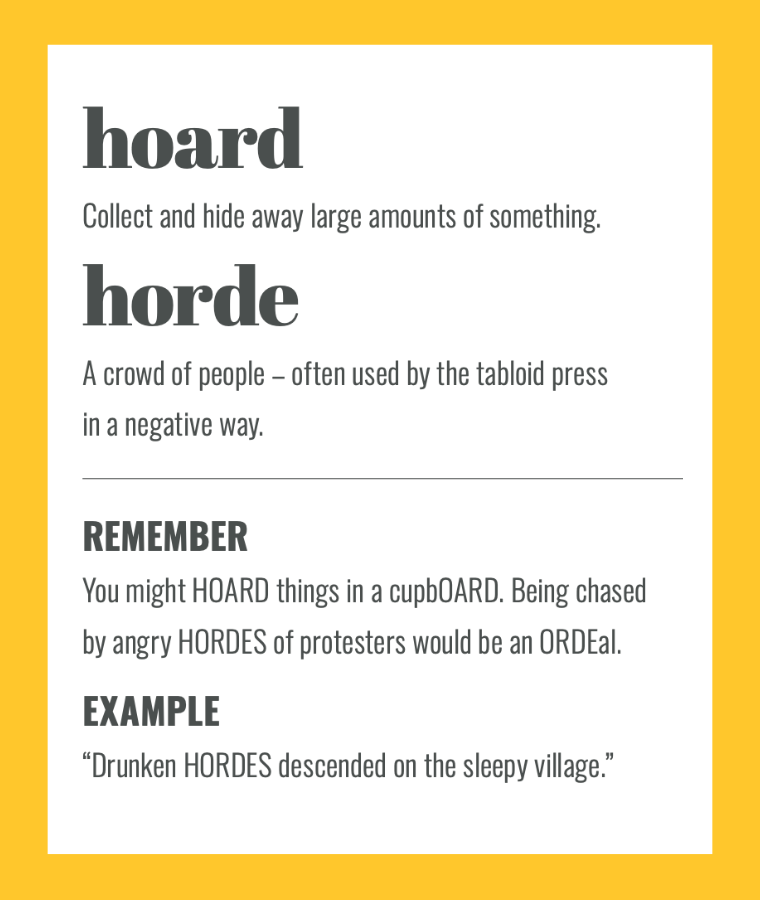
HOARD and HORDE: which is which? Learn the difference between these identical-sounding words.
HOARD and HORDE are easy to confuse. The fact that the two words sound the same – they’re homophones – means people commonly mix them up.
Here, I outline the difference between HOARD and HORDE.
When to use hoard
HOARD is a verb meaning to never throw anything away.
For example:
“I love to hoard old magazines.”
When to use horde
HORDE is a noun, meaning a crowd of people. It’s often used by the tabloid press in a negative way. It’s a little tenuous, but you can use this knowledge to remember which spelling you need, if you think of the word ordeal:
For example:
“She was chased out of the building by a horde of angry people. It was quite an ordeal.”
Want more writing tips?
For more language love, join my Clever Copy Club and get monthly updates direct to your inbox. Alternatively, email me, follow me on Twitter, connect on LinkedIn or like my page on Facebook.
Get more tips in The Little Book of Confusables
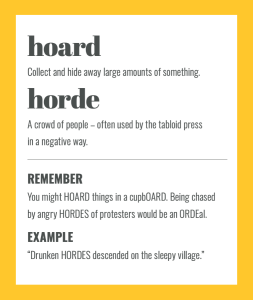
HOARD vs HORDE. Excerpt from The Little Book of Confusables by Sarah Townsend.
Marinate vs marinade: simple tips to help you remember
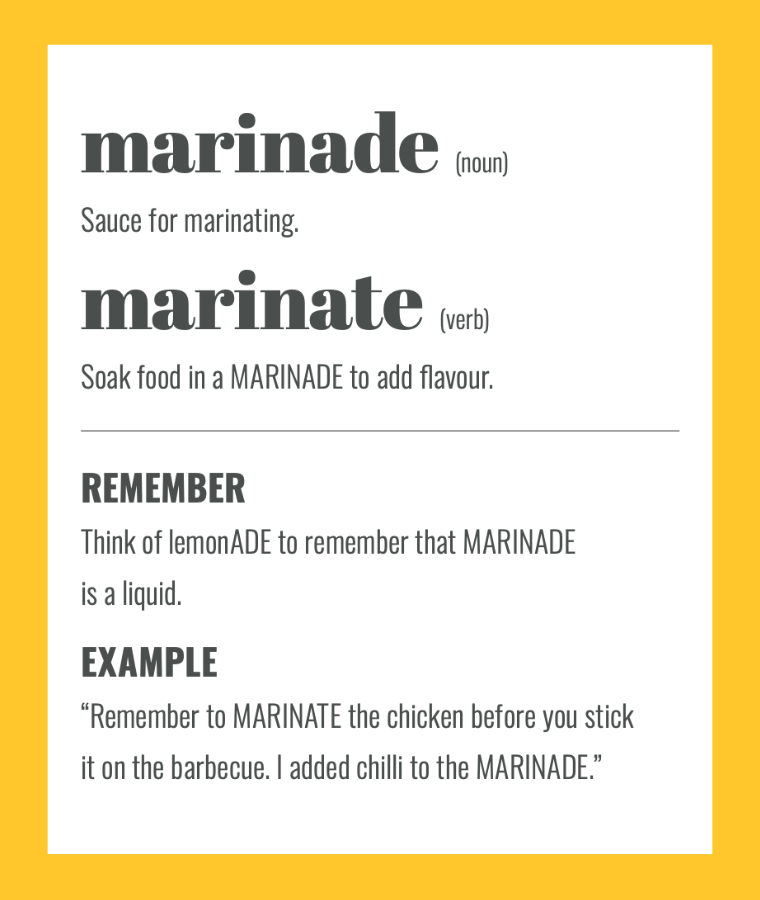
MARINATE vs MARINADE – simple tips to remember the difference
MARINATE and MARINADE are easy to confuse. They may sound similar but they have different meanings. These simple tips will help you decide which word you need.
Marinate
MARINATE is a verb, meaning to soak food in a MARINADE to give it flavour and richness.
“Remember to marinate the chicken before you stick it on the barbecue!”
Marinade
MARINADE is a noun. It’s the sauce or liquid in which a dish is MARINATED, to provide flavour.
“Have you added chillis to the marinade?”
If you find it tricky to remember the difference, think of lemonADE to remember that marinADE is a liquid.
I hope this helps you to remember the difference between MARINATE and MARINADE.
Want more writing tips?
For more language love, join my Clever Copy Club and get monthly updates direct to your inbox. Alternatively, email me, follow me on Twitter, connect on LinkedIn or like my page on Facebook.
Get more tips in The Little Book of Confusables
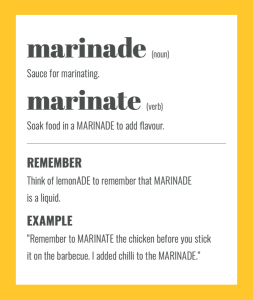
MARINATE vs MARINADE. Excerpt from The Little Book of Confusables by Sarah Townsend.
Principal vs principle: do you know the difference?

PRINCIPAL or PRINCIPLE: which is which? Simple spelling tips to help you remember the difference.
PRINCIPAL or PRINCIPLE – two words with very different meanings. What do they mean – and how do you decide which spelling you need? It’s easy.
These spelling tips will help you decide whether you need to write PRINCIPAL or PRINCIPLE.
Principal
PRINCIPAL is a noun, meaning the head of a school or college, or the most important person within an organisation.
The easiest way to learn this is to remember that PAL is a noun: your PAL the princiPAL.
For example:
“Ms George is the college principal.”
Spelled this way, PRINCIPAL is also an adjective, meaning the chief or most important.
“Increasing turnover is our principal goal.”
Remember the A in principAl and the A in mAin.
Principle
PRINCIPLE is also a noun that describes a fundamental truth or belief.
For example:
“These are the principles of good grammar.”
OR
“I don’t agree with his principles.”
I hope this helps you to remember the difference between PRINCIPAL and PRINCIPLE.
Want more writing tips?
For more language love, join my Clever Copy Club and get monthly updates direct to your inbox. Alternatively, email me, follow me on Twitter, connect on LinkedIn or like my page on Facebook.
Get more tips in The Little Book of Confusables
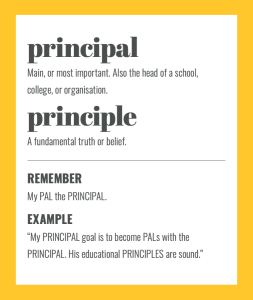
PRINCIPAL vs PRINCIPLE. Excerpt from The Little Book of Confusables by Sarah Townsend.
Practice vs practise: spelling tips to help you remember
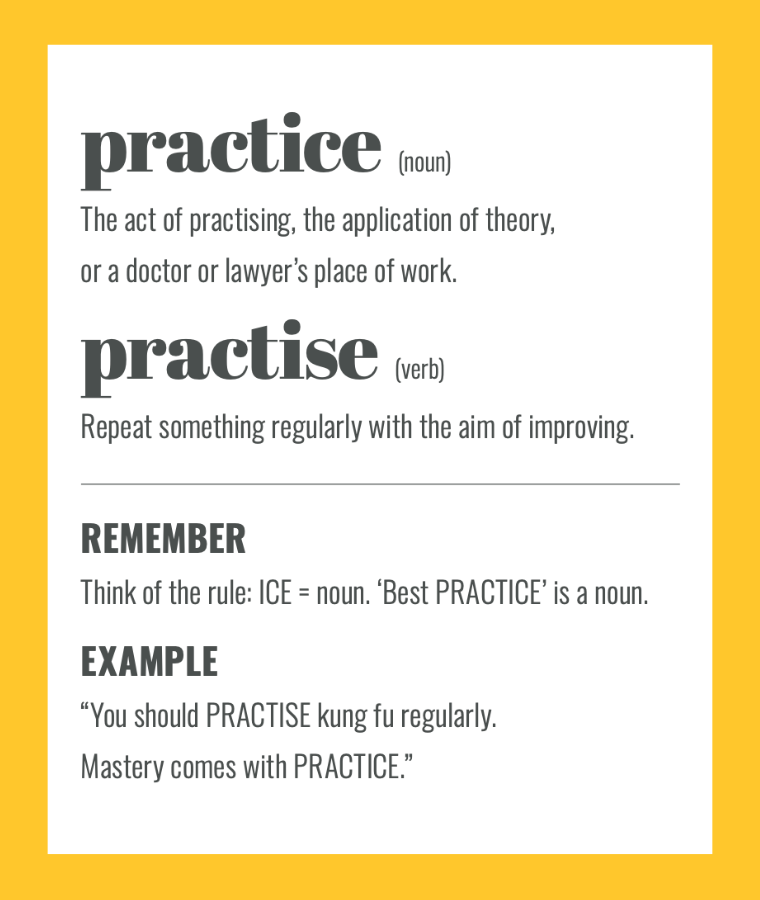
PRACTICE and PRACTISE are easy to confuse. The fact that both words sound the same trips people up time and time again.
Here are my simple tips to remember the difference between PRACTICE and PRACTISE.
(Important note: these tips don’t apply if you’re writing in US English, where both the noun and the verb are spelled PRACTICE.)
PRACTICE is a noun.
This is easy to learn when you remember that ICE is a noun.
“Mastery of any skill comes from plenty of practice.”
OR
“I have a meeting at my accountant’s practice.”
__
Bonus tip
If you know the trick for PRACTICE vs PRACTISE – remembering that ICE is a noun – you can apply the same C vs S spelling rule to other word pairs, like ADVICE and ADVISE or DEVICE and DEVISE.
__
PRACTISE is a verb. Use it like this:
“Have you remembered to practise your piano?”
OR
“It’s a good idea to practise your spelling.”
Want more writing tips?
For more language love, join my Clever Copy Club and get monthly updates direct to your inbox. Alternatively, email me, follow me on Twitter, connect on LinkedIn or like my page on Facebook.
Get more tips in The Little Book of Confusables
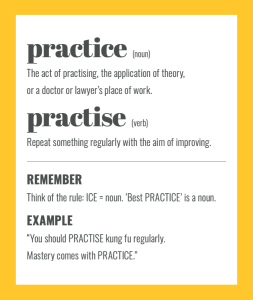
PRACTICE vs PRACTISE. Excerpt from The Little Book of Confusables by Sarah Townsend.











